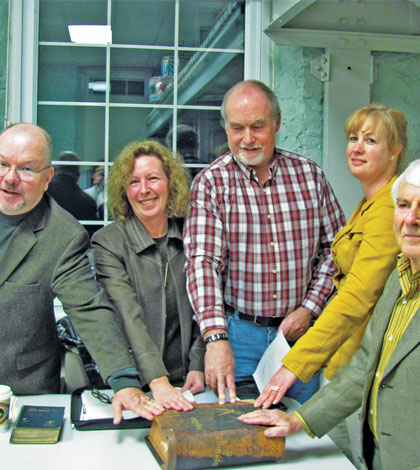MANITOULIN—One of the many issues discussed and agreed upon at the annual meeting of the Assembly of First Nations (AFN) last week included a date being set for the election of a new leader of the organization. Another major issue was the second rejection by the AFN of Bill C-33, the First Nations Education Act, in its present form.
“There was a resolution passed by our members that clearly states that bill C-33 must be killed and go to regional approaches for consideration,” stated Patrick Madahbee, grand council chief of the Anishinabek Nation, after the three days of meetings last week.
This comes after the AFN considered several counter-proposals to a controversial Conservative bill to reform aboriginal education. However, none of the draft resolutions put forward at the three-day meeting held in Halifax, Nova Scotia recommended accepting the legislation as it now stands.
As CTV News reported on July 16, 2014, Aboriginal Affairs Minister Bernard Valcourt has flatly said the bill will remain on hold and no new money will be spent until the AFN gets behind the legislation.
CTV News reported it is not clear if the $1.9 billion that had been tied to the original bill is still on offer. Andre Richer, a spokesperson for Mr. Valcourt’s office, said the government is extremely disappointed that the AFN did not honour its agreement with the government. He said the legislation will not proceed without the support of AFN, and the government will not invest new money in an education system that does not serve the best interests of First Nations children; funding will only follow real education reforms.
Chief Madahbee pointed out, “I’m sure people will wonder why we are turning down the $1.9 billion. It is a huge amount of money, but the government is implementing this over seven years for 633 First Nations across the country and the amount being provided doesn’t address the shortfall in funding gap in Ontario alone.”
“First Nations would not have control over our own education system with this Bill, and the funds are not being provided until after the next federal election in 2015,” Chief Madahbee continued. “And when the government comes out with its throne speech after the election, we question if First Nations issues will be a priority if this current government wins the election. Will they need to appease another province, say Quebec, and what will that mean concerning the funding that is being promised now for First Nations education? We need guarantees.”
“In the Ontario region alone, the government has acknowledged there is a gap of $1.9 billion for First Nation education and we can’t put in place our own education reform until we have more money,” said Chief Madahbee. “A more regional approach for education makes more sense. If we have to look at a Canada wide system, there are some major differences from one province to another and even in some communities to other communities in an area that would have to be taken into consideration.”
As has been reported previously, Chief Madahbee explained that the rejection of Bill C-33, the First Nations Control of First Nations Education Act, had been vetted by technicians, lawyers, educators, parents and students. What First Nations saw in the bill was a lot of government control and no First Nations control of education for their children.
The First Nations leaders will be voting to elect a new chief by the end of this year, said Chief Madahbee. “Direction was given and adopted at the meeting that there will be an election for a national chief held in December in Winnipeg.” Ghislain Picard, the regional chief for Quebec, has been the AFN spokesperson since the departure of Shawn Atleo in May amid criticism of his support of proposed changes to federal legislation related to aboriginal education.
“Mr. Picard, who has been the interim spokesman for the AFN, has been put in as interim national chief until the elections are held,” said Chief Madahbee.




